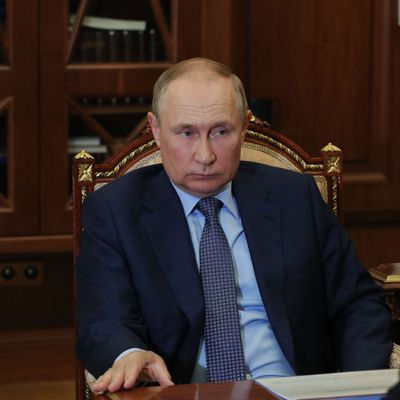
Russia’s war in Ukraine, which began with a disastrous attempted invasion of the entire country, settled months ago into a grinding slog centered in the country’s south and east. But now Ukraine is on the march, having launched an offensive in the south hoping to retake some territory previously captured by Russia. As Vladimir Putin resists a national war mobilization, his army continues to suffer grievous numbers of casualties, struggles to maintain a supply of qualified soldiers, and contends with shortages in equipment and artillery — a problem exacerbated by poor manufacturing and punishing western sanctions.
Russia is now cut off from western components needed to produce some of the matériel it needs for the war, forcing Putin to source new weaponry from a small menu of authoritarian states who need money and don’t care about breaking western rules. Last month, it was Iran; this month, it’s North Korea.
The New York Times reported Tuesday that Kim Jong-un is supplying Putin with millions of rockets and artillery shells from his extensive arsenal. This development may not mean that Russia is in dire straits, militarily speaking. But it probably isn’t a great sign, either.
“In terms of its logistics and sustainment capabilities as it relates to Ukraine,” said Pentagon spokesman Pat Ryder, “we assess that things are not going well on that front for Russia.” An anonymous U.S. official told the AP, “The Russian military continues to suffer from severe supply shortages in Ukraine, due in part to export controls and sanctions.”
In some ways, the economic measures imposed against Russia by Western Europe and the U.S. have been ineffective so far. Countries like India, China, and Brazil have been more than happy to snap up the Russian oil that ex-customers like Germany once bought, leading to record profits in that sector. And Russian society has yet to feel much of a bite from the west’s isolation tactics, even if Muscovites can’t visit the Apple Store or get French fries at a real McDonald’s. (Though the country may be hurting more than it appears.) Russia has also been able to use its oil-and-gas leverage against Europe to ensure some of its adversaries experience a precarious and expensive winter.
But arms sales are a different matter. China, the country that would be most useful to Russia in this regard, hasn’t condemned Putin for his invasion — but has also shown no enthusiasm for shipping him weapons. Doing so would straightforwardly violate American sanctions and mean that the U.S. could refuse to supply Chinese weapons manufacturers with essential U.S. technology. Other non-European countries have remained officially neutral as well, and are not eager to cross the U.S. economically. That leaves heavily armed, rogue, or quasi-rogue regimes. But so far, this strategy has run into problems, too; the drones that Russia purchased from Iran have reportedly been plagued with technical problems. North Korea surely has plenty of ammo to spare, since it has the world’s fourth-largest military — but experts believe it mostly relies on outdated equipment (including Soviet-era stockpiles). Meanwhile, the U.S. continues to arm Ukraine with high-end anti-tank missiles and other artillery, having sent about $10 billion in security assistance thus far.
Russia’s military still dwarfs Ukraine’s. It is certainly still capable of engaging in a grinding war of attrition for years, and of inflicting massive destruction on Ukraine, with nuclear weapons as its trump card. Still, none of this has gone the way Putin wanted it to.
This post has been updated.






























